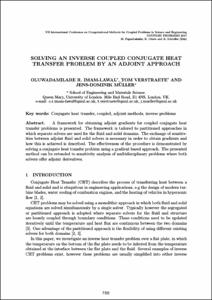Mostra el registre d'ítem simple
Solving an inverse coupled conjugate heat transfer problem by an adjoint approach
| dc.contributor.author | Imam-Lawal, Oluwada Milare R. |
| dc.contributor.author | Verstraete, Tom |
| dc.contributor.author | Müller, Jens-Dominik |
| dc.date.accessioned | 2020-06-15T06:20:24Z |
| dc.date.available | 2020-06-15T06:20:24Z |
| dc.date.issued | 2017 |
| dc.identifier.isbn | 978-84-946909-2-1 |
| dc.identifier.uri | http://hdl.handle.net/2117/190685 |
| dc.description.abstract | A framework for obtaining adjoint gradients for coupled conjugate heat transfer problems is presented. The framework is tailored to partitioned approaches in which separate solvers are used for the fluid and solid domains. The exchange of sensitiv- ities between adjoint fluid and solid solvers is necessary in order to obtain gradients and how this is achieved is described. The effectiveness of the procedure is demonstrated by solving a conjugate heat transfer problem using a gradient based approach. The presented method can be extended to sensitivity analysis of multidisciplinary problems where both solvers offer adjoint derivatives. |
| dc.format.extent | 12 p. |
| dc.language.iso | eng |
| dc.publisher | CIMNE |
| dc.subject | Àrees temàtiques de la UPC::Matemàtiques i estadística::Anàlisi numèrica::Mètodes en elements finits |
| dc.subject.lcsh | Finite element method |
| dc.subject.lcsh | Coupled problems (Complex systems) -- Numerical solutions |
| dc.subject.other | Conjugate heat transfer, coupled, adjoint methods, inverse problems |
| dc.title | Solving an inverse coupled conjugate heat transfer problem by an adjoint approach |
| dc.type | Conference report |
| dc.subject.lemac | Elements finits, Mètode dels |
| dc.rights.access | Open Access |
| local.citation.contributor | COUPLED VII |
| local.citation.startingPage | 788 |
| local.citation.endingPage | 799 |


